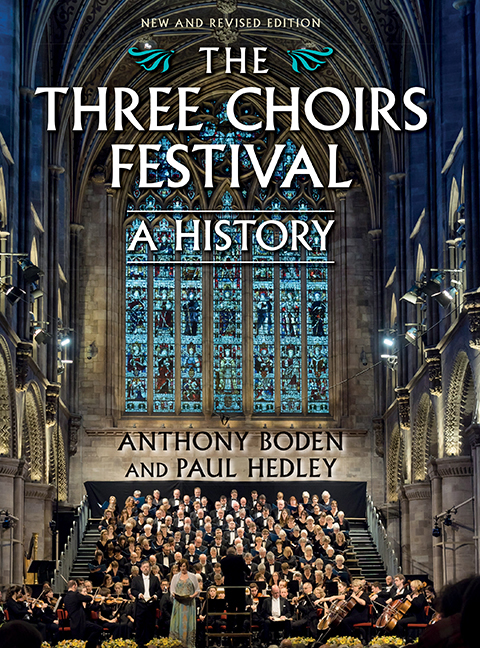Book contents
- Frontmatter
- Contents
- List of Illustrations
- Preface
- Acknowledgements
- List of Abbreviations
- List of Cathedral Organists
- 1 Origins
- 2 A Fortuitous and Friendly Proposal
- 3 A Numerous Appearance of Gentry
- 4 ‘The Musick of my Admiration Handel’
- 5 The Gentlemen and the Players
- 6 Avoiding Shipwreck
- 7 Prima voce
- 8 Favourites and Flops
- 9 Sacred and Profane
- 10 Froissart
- 11 The Unreasonable Man
- 12 The Dream
- 13 Beyond these Voices
- 14 An Essentially English Institution
- 15 The Elgar Festivals
- 16 Dona nobis pacem
- 17 Recovery
- 18 Association
- 19 A New Epoch
- 20 Jubilee
- 21 Theme with Variations
- 22 Houses of the Mind
- 23 ‘A Gold-Plated Orchestra’
- 24 A New Millennium
- 25 Reorganisation
- 26 An Invitation to the Palace
- Appendix Three Choirs Festival Timeline
- Select Bibliography
- Index
- Plate section
15 - The Elgar Festivals
Published online by Cambridge University Press: 11 August 2017
- Frontmatter
- Contents
- List of Illustrations
- Preface
- Acknowledgements
- List of Abbreviations
- List of Cathedral Organists
- 1 Origins
- 2 A Fortuitous and Friendly Proposal
- 3 A Numerous Appearance of Gentry
- 4 ‘The Musick of my Admiration Handel’
- 5 The Gentlemen and the Players
- 6 Avoiding Shipwreck
- 7 Prima voce
- 8 Favourites and Flops
- 9 Sacred and Profane
- 10 Froissart
- 11 The Unreasonable Man
- 12 The Dream
- 13 Beyond these Voices
- 14 An Essentially English Institution
- 15 The Elgar Festivals
- 16 Dona nobis pacem
- 17 Recovery
- 18 Association
- 19 A New Epoch
- 20 Jubilee
- 21 Theme with Variations
- 22 Houses of the Mind
- 23 ‘A Gold-Plated Orchestra’
- 24 A New Millennium
- 25 Reorganisation
- 26 An Invitation to the Palace
- Appendix Three Choirs Festival Timeline
- Select Bibliography
- Index
- Plate section
Summary
THE interwar years were, above all, the years of the ‘Elgar Festivals’. At a time when his music was out of fashion elsewhere in the country, Elgar was lionised at Three Choirs, and he in turn honoured the Festivals by regular appearances, usually conducting his own works. As the Musical Times put it in 1921, ‘his world-wide fame finds its focus in the Three Choirs Festival, and if he owed something to them in his youth, he is now paying back the debt with interest’. But worldwide fame and popularity are different things. Britain chose to neglect Elgar. Following a 1922 performance of The Apostles in a half-empty Queen's Hall, George Bernard Shaw, writing to the Daily News, apologised ‘to posterity for living in a country where the capacity and tastes of schoolboys and sporting costermongers are the measure of metropolitan culture’:
The Apostles is one of the glories of British music … It places Britain once more definitely in the first European rank, after two centuries of leather and prunella.
It would be an exaggeration to say that I was the only person present, like Ludwig of Bavaria at Wagner's premieres. My wife was there. Other couples were visible at intervals. One of the couples consisted of the Princess Mary and Viscount Lascelles, who just saved the situation as far as the credit of the Crown is concerned, as it very deeply is. I distinctly saw six people in the stalls, probably with complimentary tickets.
On the other hand, Three Choirs audiences for Gerontius, The Apostles and The Kingdom frequently exceeded in number those for Elijah and even Messiah. Nowhere else were Elgar's works performed with quite such dedication, and nowhere else so regularly under his own direction. At no other national festival or concert venue could performers and public alike mingle socially and meet so easily with leading composers – and the familiar figure of Elgar, often in company with his friend and champion Bernard Shaw, could hardly be missed, especially when he chose to wear full court dress with orders.
- Type
- Chapter
- Information
- The Three Choirs Festival: A HistoryNew and Revised Edition, pp. 198 - 220Publisher: Boydell & BrewerPrint publication year: 2017

